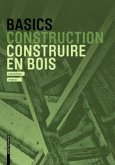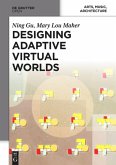The "old” material of wood has been used to construct dwellings of different types since the dawn of mankind. And not without reason. Its low density combined with high rigidity, good processability, and its resistance makes it an excellent building material. There is currently a pioneering renaissance of the timber construction, for two distinct reasons: first, wood is increasingly being rediscovered as one of the most important renewable raw materials for sustainable construction. Moreover, a revolution in the construction of timber structures began several years ago with the ever-progressive use of three-dimensional CAD models for digitally controlled robot manufacturing. The book documents these developments, in particular the engineering bonding techniques, the introduction of digital production techniques, and the innovative material developments of this material. The chapter on composite structures and experimental structures specifically address trends toward the future-oriented dimensions of timber construction. In the final section, outstanding designs are documented in detail, such as the Club House of Haesley Nine Bridges Golf Course designed by Shigeru Ban in Yeoju, South Korea, and the double gymnasium in Borex-Crassier, Switzerland, by Graeme Mann and Patricia Capua Mann .
Das "alte" Material Holz wird seit Anbeginn der Menschheit zum Bauen von Behausungen unterschiedlicher Art verwendet. Nicht ohne Grund, eignet es sich doch aufgrund seiner geringen Dichte bei zugleich hoher Steifigkeit, der guten Verarbeitbarkeit und seiner Beständigkeit hervorragend als Baumaterial.
Gegenwärtig ereignet sich eine wegweisende Renaissance des Holzbaus, die vor allem auf zwei eigenständige Ursachen zurückzuführen ist: Zum einen wird Holz zunehmend als einer der wichtigsten nachwachsenden Rohstoffe für das nachhaltige Bauen wiederentdeckt. Zum anderen findet seit wenigen Jahren durch den immer fortschreitenden Einsatz von dreidimensionalen CAD-Modellen für eine digital gesteuerte Roboterfertigung eine Revolution im konstruktiven Holzbau statt.
Das Buch dokumentiert diese Weiterentwicklungen, insbesondere die ingenieurmäßigen Verbindungstechniken, die Einführung der digitalen Produktionstechniken sowie die innovativen Materialentwicklungen dieses Werkstoffes. Vornehmlich die Kapitel über Verbundkonstruktionen und experimentelle Strukturen greifen Tendenzen auf, die zukunftsorientierte Dimensionen des Holzbaus eröffnen.
In einem abschließenden Teil werden herausragende Gestaltungen detailliert dokumentiert, etwa das Clubhaus der Haesley-Nine-Bridges Golfanlage von Shigeru Ban in Yeoju, Südkorea, und die Doppelturnhalle in Borex-Crassier, Schweiz, von Graeme Mann und Patricia Capua Mann.
Hinweis: Dieser Artikel kann nur an eine deutsche Lieferadresse ausgeliefert werden.
Das "alte" Material Holz wird seit Anbeginn der Menschheit zum Bauen von Behausungen unterschiedlicher Art verwendet. Nicht ohne Grund, eignet es sich doch aufgrund seiner geringen Dichte bei zugleich hoher Steifigkeit, der guten Verarbeitbarkeit und seiner Beständigkeit hervorragend als Baumaterial.
Gegenwärtig ereignet sich eine wegweisende Renaissance des Holzbaus, die vor allem auf zwei eigenständige Ursachen zurückzuführen ist: Zum einen wird Holz zunehmend als einer der wichtigsten nachwachsenden Rohstoffe für das nachhaltige Bauen wiederentdeckt. Zum anderen findet seit wenigen Jahren durch den immer fortschreitenden Einsatz von dreidimensionalen CAD-Modellen für eine digital gesteuerte Roboterfertigung eine Revolution im konstruktiven Holzbau statt.
Das Buch dokumentiert diese Weiterentwicklungen, insbesondere die ingenieurmäßigen Verbindungstechniken, die Einführung der digitalen Produktionstechniken sowie die innovativen Materialentwicklungen dieses Werkstoffes. Vornehmlich die Kapitel über Verbundkonstruktionen und experimentelle Strukturen greifen Tendenzen auf, die zukunftsorientierte Dimensionen des Holzbaus eröffnen.
In einem abschließenden Teil werden herausragende Gestaltungen detailliert dokumentiert, etwa das Clubhaus der Haesley-Nine-Bridges Golfanlage von Shigeru Ban in Yeoju, Südkorea, und die Doppelturnhalle in Borex-Crassier, Schweiz, von Graeme Mann und Patricia Capua Mann.
Hinweis: Dieser Artikel kann nur an eine deutsche Lieferadresse ausgeliefert werden.








